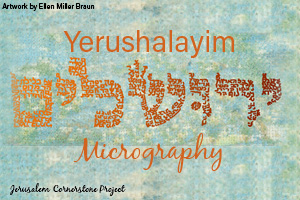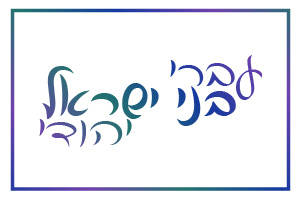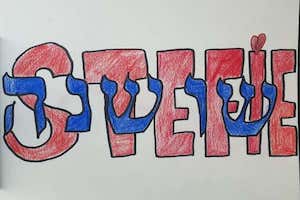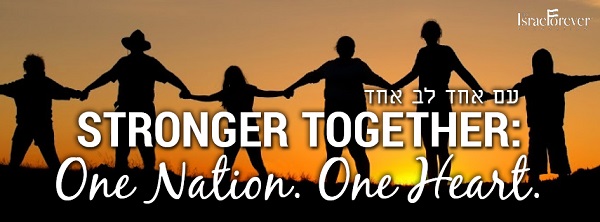Israel and the Meaning of 70
In Jewish tradition numbers have meaning. 70 is a number we see appearing over and over, a pattern that emphasizes significance. Here are a few examples that you can learn about to better understand the many faces of the nation and history of our people Israel.
70 sons of Abraham including Jacob and Esau and their offspring divided amongst Ishmael, Edom and Keturah. 70 Israelite groups = The Tribal Clans of Israel (Genesis ch.46, Numbers ch.26).

70 nations of Noah/of the world. Each tribe of Israel is parallel to a specific non-Israelite nation (Deuteronomy 32:8). According to the medieval commentator Rabbenu Bachye, “We learn from this verse that the world comprises 70 nations, each with its own language.”
70 languages spoken after the destruction of the Tower of Babel, which fostered chaos among them. One generation after the great flood in Noah's time, a group had arisen to build a structure that would reach the heavens. They would ascend it and fight G‑d. This became known as the Tower of Babel. As punishment for their rebellion, G‑d planted strife and disagreement among them by causing each to speak a different language and not understand his fellow workers. From the unfinished Tower of Babel, the different languages separated from each other, and formed seventy nations.
70 was the key to the creation of the Jewish people in the book of Exodus, moving the story of our ancestors from family to nation. As it is written, “And it was that all those who were direct descendants of Jacob were seventy souls” (1:5). While Jacob’s family members only numbered 69, it is believed that God was the 70th member as a demonstration that he could not be separated from his people.
70 souls of the Children of Israel went as a community with the Patriarch Jacob when he led his family into Egypt to escape the famine. The combined and united family consisted of 70 individuals with one common purpose - survival. (Genesis 46:27)
70 elders were assembled by Moses on God's command in the desert (Numbers 11:16-30). And as the People of Israel prepared to enter the Land of Israel, Moses instructs them to gather large stones, cover them with plaster and inscribe “every word of this teaching most distinctly [be’er hetev]” (Deuteronomy 27:8). The Talmud explains that “be’er hetev” means Moses translated the Torah into 70 languages. It was not enough that “this teaching” be understood by Israel, Moses wanted it to be shared with all the 70 nations in their own language.
According to Aggadah, Jewish tradition, there are 70 perspectives ("faces") to the Torah (Numbers Rabbah 13:15). Seventy angles, seventy levels of depth - all accessible to the 70 faces of Israel and their many connections.
70 names to the holy city of Jerusalem, named and made significant by King David after he conquered and then purchased the land for the laying of the first stone to mark our ancestral connection on Mount Moriah. Watch this beautiful video you can discover some of the different names used throughout the Bible for Jerusalem.
70 holy days every year – 52 Shabbatot, the 7 days of Pesach, the 7 days of Sukkot, 1 day of Shmini Atzeret, 2 days of Rosh Hashanah, 1 day Yom Kippur – according to the festivals in Israel, not the Diaspora which add days for each observance.
70 offerings were made in the Temple in Jerusalem during the festival of Sukkot representing all the nations on earth
70 wise men of the Sanhedrin, the Supreme Court of Ancient Israel Sanhedrin 1:4 and 70 is the number which reminds us that we are judged by the same divine standards that governed the rulings of the Sanhedrin.
70 Years of Babylonian Exile after the Jews were expelled from the Land of Israel and Jerusalem, according to the book of Jeremiah 29:10 The exile formally ended in 538 BCE, when Cyrus the Great, the Persian conqueror of Babylonia, in his first year of reign, gave the Jews permission to return to Palestine and decreed that the Jews could return to Jerusalem to rebuild their temple. While it is known that many deportations of Jews resulted from this proclamation, not all Jews were forced to leave the country they were living in with some Jews choosing to remain in Babylonia—thus constituting the first of numerous Jewish communities living permanently in the Diaspora.
70 years after the destruction of the First Temple, began the construction of the Second Temple in Jerusalem and the Jewish presence returned to Israel, becoming the first people in history to regain a land they had lost by battle or expulsion.
70 CE the Siege on Jerusalem by the Romans began and the Second Temple was destroyed, resulting in the longest exile of the Jews from our homeland. 70 also marks the year the name of Jerusalem was changed to Aelia Capitolina and Israel to Palestine, as means of de-Judaizing the land and its legacy and history.
70 = Septuagint (from the Latin for "seventy") = the translation of the Torah into Greek as ordered by Ptolemy II Philadelphus . The Roman numeral seventy, LXX, is the scholarly symbol for the Septuagint.
70 Weeks of Years or 490 years (70×7) was emphasized by the hero Daniel as spiritual punishment for Israel’s sins.
70 years is considered to be a generation of human life (Psalm 90). It is believed that in each generation Amalek rises up against the people of Israel, and we see throughout Jewish history these repeated patterns in terms of 70 years or multiples thereof. And
70 IS OPPORTUNITY. 70 IS POTENTIAL.
70 REPRESENTS COMPLETION, WHOLENESS, THE REAL THING.
70 REPRESENTS COMPLETION, WHOLENESS, THE REAL THING.
70 years between the First Zionist Congress in 1897 and the reunification of Jews with Jerusalem during the Six Day War in 1967.
70 years of archaeological excavations have produced countless pieces of evidence of the people of Israel’s connection to their indigenous land.
As the modern State of Israel passed 70 years of existence, we see the miracle and significance of Israel as the home of hope. When we celebrate Israel - her 70 years and her 70 Faces, when we celebrate her independence THIS is what we are celebrating!
Recommended for you:
About the Author









